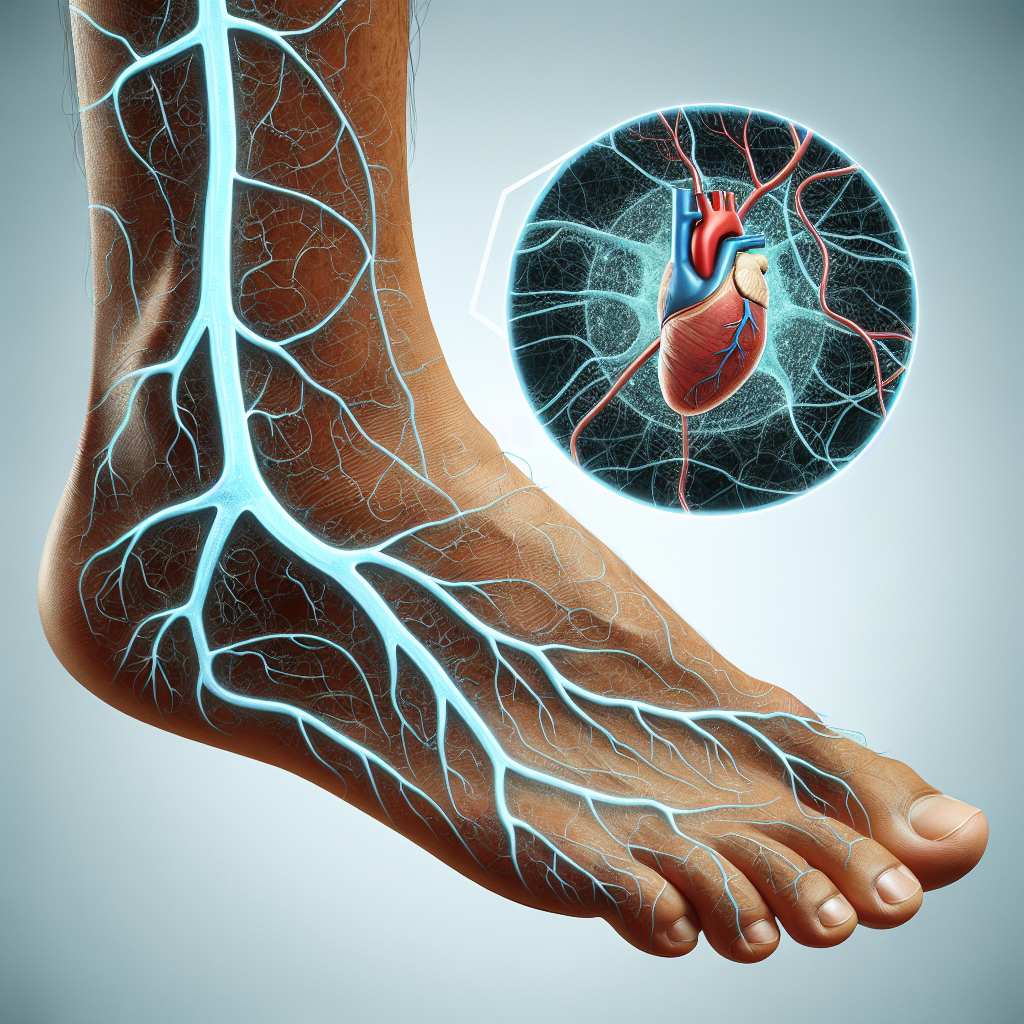You may be wondering about the link between diabetes and nerve damage. It turns out that diabetes can actually have a direct impact on your nerves, causing a condition called diabetic neuropathy. This condition affects millions of people worldwide and can result in pain, numbness, and even loss of sensation in various parts of the body. In this article, we will explore the connection between diabetes and nerve damage, uncovering the mechanisms behind this phenomenon and discussing ways to manage and prevent diabetic neuropathy. So, if you or someone you know is living with diabetes, keep reading to learn more about this important connection.
Types of Diabetes
Type 1 Diabetes
Type 1 diabetes is an autoimmune disease in which the immune system attacks the cells in the pancreas responsible for producing insulin. Insulin is a hormone that helps regulate blood sugar levels. Without sufficient insulin, glucose cannot enter cells and remains in the bloodstream, leading to high blood sugar levels. Type 1 diabetes usually develops in childhood or early adulthood and requires lifelong insulin therapy.
Type 2 Diabetes
Type 2 diabetes is the most common form of diabetes, accounting for about 90-95% of all cases. Unlike type 1 diabetes, type 2 diabetes is characterized by insulin resistance, meaning the body’s cells do not respond effectively to insulin. As a result, the pancreas produces more insulin to compensate, leading to high blood sugar levels. Type 2 diabetes is often associated with lifestyle factors such as obesity, sedentary behavior, and poor diet choices, although genetics also play a role.
Gestational Diabetes
Gestational diabetes occurs in pregnant women who have never had diabetes before. Hormonal changes during pregnancy can lead to insulin resistance, causing high blood sugar levels. While gestational diabetes usually resolves after childbirth, women who have had gestational diabetes are at an increased risk of developing type 2 diabetes later in life. Proper management of gestational diabetes is crucial to ensure the health of both the mother and the baby.
Understanding Nerve Damage
What is Nerve Damage?
Nerve damage, also known as neuropathy, refers to the condition in which the nerves in the body are damaged, leading to a disruption in the normal functioning of the nervous system. Nerve damage can occur in various parts of the body, including the peripheral nerves (nerves outside the brain and spinal cord), autonomic nerves (nerves that control involuntary functions), and cranial nerves (nerves connected to the brain).
Types of Nerve Damage
There are different types of nerve damage that can occur in individuals with diabetes. Diabetic neuropathy is the most common form of nerve damage associated with diabetes. It can affect various nerves in the body, leading to a wide range of symptoms and complications. The different types of diabetic neuropathy include peripheral neuropathy, autonomic neuropathy, proximal neuropathy, and focal neuropathy, each with its own unique features and effects on the body.

Diabetic Neuropathy
Definition and Overview
Diabetic neuropathy refers to nerve damage caused by long-term or poorly controlled diabetes. It is a chronic complication of diabetes and can develop over time. Diabetic neuropathy commonly affects the peripheral nerves, which are responsible for transmitting signals from the brain and spinal cord to the rest of the body. This condition can result in numbness, tingling, pain, and weakness, particularly in the hands and feet.
Symptoms of Diabetic Neuropathy
The symptoms of diabetic neuropathy can vary depending on the type of neuropathy and the nerves affected. Common symptoms include numbness or tingling in the extremities, especially in the feet and hands. Some individuals may experience a loss of sensation, making it difficult to detect injuries or infections. Pain, muscle weakness, and balance problems are also common symptoms. Diabetic neuropathy can significantly impact quality of life and daily functioning if left untreated.
Causes of Diabetic Neuropathy
The exact cause of diabetic neuropathy is not fully understood. However, prolonged exposure to high blood sugar levels is believed to be a major contributing factor. High blood sugar levels can damage the blood vessels that supply oxygen and nutrients to the nerves, leading to their deterioration. Additionally, inflammation and oxidative stress caused by high blood sugar levels can also contribute to nerve damage. Other factors such as genetics, smoking, and alcohol abuse may further increase the risk of developing diabetic neuropathy.
Risk Factors
High Blood Sugar Levels
High blood sugar levels, especially over an extended period, significantly increase the risk of developing diabetic neuropathy. Chronically elevated blood sugar levels can lead to oxidative stress and inflammation, damaging the nerves and blood vessels.
Duration of Diabetes
The longer an individual has diabetes, the greater their risk of developing diabetic neuropathy. Over time, the cumulative effects of high blood sugar levels can cause nerve damage.
Poorly Managed Diabetes
Failure to effectively manage diabetes can increase the risk of developing complications, including diabetic neuropathy. Proper blood sugar control through medication, diet, and lifestyle modifications is essential in reducing the risk of nerve damage.

Mechanism of Nerve Damage
Hyperglycemia and Oxidative Stress
High blood sugar levels, a characteristic feature of diabetes, can lead to an excess production of free radicals and oxidative stress. These harmful molecules can damage nerve cells and disrupt their normal functioning, contributing to the development of neuropathy.
Inflammation and Nerve Damage
Chronic inflammation, another consequence of diabetes, can cause damage to nerves. Inflammatory processes disrupt the normal functioning of nerve cells and interfere with their protective coverings, leading to nerve damage.
Damage to Blood Vessels
Elevated blood sugar levels can damage the blood vessels that supply vital nutrients and oxygen to the nerves. Reduced blood flow and nutrient delivery can cause nerve cells to degenerate and sustain irreversible damage.
Specific Types of Diabetic Neuropathy
Peripheral Neuropathy
Peripheral neuropathy is the most common form of diabetic neuropathy, affecting the peripheral nerves. It often presents as numbness, tingling, or pain in the extremities, particularly the feet and legs. Peripheral neuropathy can also cause muscle weakness and coordination difficulties.
Autonomic Neuropathy
Autonomic neuropathy affects the nerves that control involuntary bodily functions, such as heart rate, blood pressure, digestion, and bladder control. Symptoms may include abnormal heart rate, difficulty digesting food, and bladder dysfunction.
Proximal Neuropathy
Proximal neuropathy affects the nerves in the hips, thighs, and buttocks, leading to muscle weakness and pain in these areas. This type of neuropathy usually affects one side of the body and can make it difficult to walk or stand up from a seated position.
Focal Neuropathy
Focal neuropathy involves damage to individual nerves, leading to weakness or pain in a specific part of the body. It can affect any nerve, including those controlling the head, torso, or leg muscles. Focal neuropathy often develops suddenly and causes severe pain.

Prevention and Treatment
Diabetes Management and Blood Sugar Control
Proper management of diabetes is crucial in preventing or slowing down the progression of diabetic neuropathy. This includes maintaining target blood sugar levels through a combination of medication, regular monitoring, a healthy diet, and regular exercise.
Medications for Diabetic Neuropathy
Various medications can be prescribed to manage the symptoms of diabetic neuropathy. These may include pain medications, such as over-the-counter analgesics or prescription drugs, as well as certain antidepressants and anticonvulsants that can help alleviate neuropathic pain.
Lifestyle Modifications
Making lifestyle modifications can significantly improve the symptoms and progression of diabetic neuropathy. This may include adopting a healthy diet that is low in sugar and processed foods, engaging in regular physical activity, losing weight if necessary, quitting smoking, and limiting alcohol consumption.
Tips for Nerve Health
Regular Exercise and Physical Activity
Engaging in regular physical activity, such as walking, swimming, or cycling, can help improve circulation and nerve function. Exercise also helps manage blood sugar levels and reduces the risk of developing complications associated with diabetes.
Healthy Diet
Following a balanced and nutritious diet is essential for maintaining overall health and preventing diabetic complications. A diet high in fruits, vegetables, whole grains, and lean proteins, while limiting sugary and processed foods, can support nerve health and overall well-being.
Regular Foot Care
Individuals with diabetic neuropathy should pay special attention to their foot health. Proper foot care, including daily inspection, moisturizing, and wearing comfortable, well-fitting shoes, can help prevent foot ulcers, infections, and other foot-related complications.

Complications of Diabetic Neuropathy
Foot Ulcers and Infections
Reduced sensation in the feet due to diabetic neuropathy can make it difficult to detect injuries or sores. Without proper care, these wounds can develop into foot ulcers and become infected, potentially leading to severe complications, including the need for amputation.
Amputation
Severe nerve damage and related complications, such as foot ulcers or infections, may necessitate amputation in some cases. Regular foot care, early detection of issues, and proper management of blood sugar levels can help reduce the risk of requiring amputation.
Digestive Issues
Autonomic neuropathy can affect the nerves that control digestion, leading to problems such as gastroparesis (delayed stomach emptying) or diarrhea. Proper management of blood sugar levels and dietary adjustments can help alleviate these symptoms.
Sexual Dysfunction
Diabetic neuropathy can affect the nerves that control sexual function, leading to problems such as erectile dysfunction in men and decreased sensation or lubrication in women. Open communication with a healthcare provider is essential in addressing and managing sexual dysfunction.
Conclusion
Diabetic neuropathy is a common and potentially debilitating complication of diabetes. Understanding the different types, causes, and mechanisms of nerve damage associated with diabetes is crucial in preventing its development and managing its symptoms. By properly managing blood sugar levels, adopting a healthy lifestyle, and seeking appropriate medical care, individuals with diabetes can reduce the risk of diabetic neuropathy and maintain optimal nerve health. Regular monitoring and early intervention are key to preventing or minimizing complications and ensuring a better quality of life for those affected by diabetic neuropathy.


